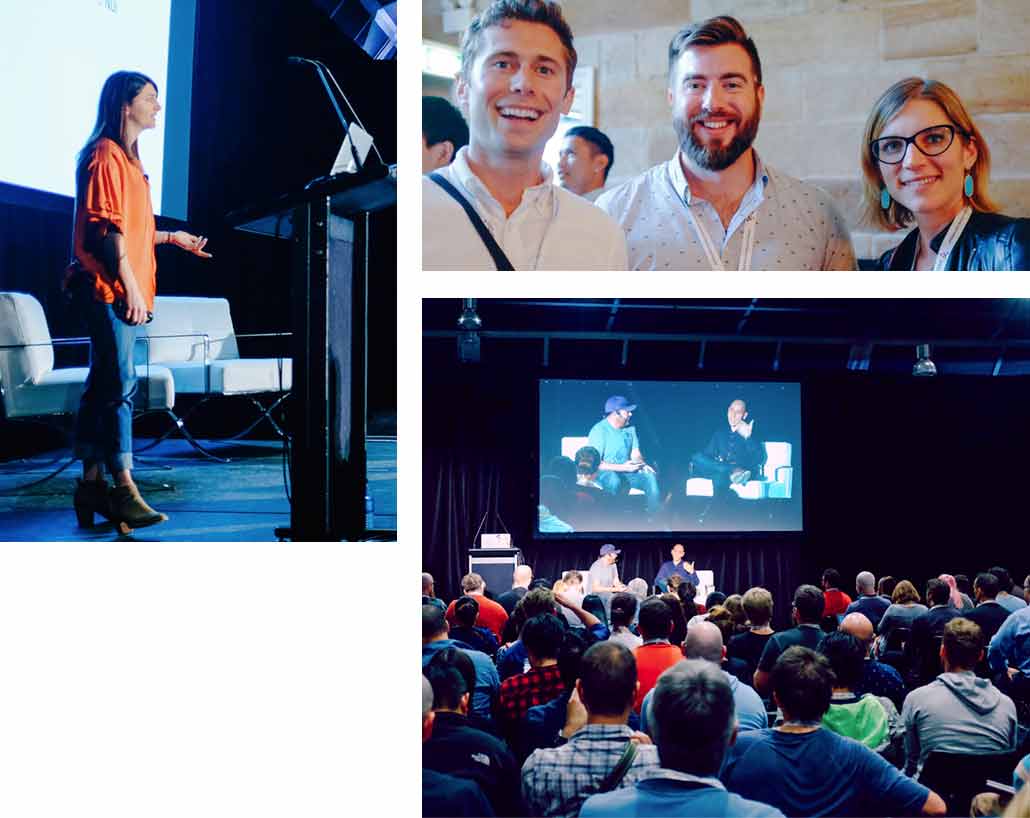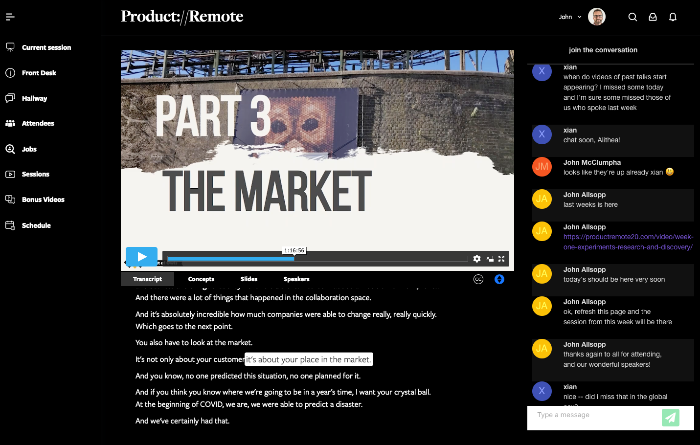Web Directions Conffab
Stream and download nearly 1,000 presentations from hundreds of world leading experts at 50 conferences…and counting
With free and paid levels, keep up to date with all that's happening in our industry at your own pace.
a conference all about, and only about JavaScript
Most widely-used programming languages have conferences specifically dedicated to the language. CPPCon for C++, PyCon for Python, GopherCon for Go, Dart Summit, and many others.
There are many conferences that feature aspects of JavaScript: some are commercial, some community, but there are none whose primary focus is the language itself.
GlobalScope aims to focus specifically on JavaScript the language.
From front end and node developers, to library and framework developers, Global Scope is for anyone who works with JavaScript.
All Web Directions conferences feature in-depth knowledge from real world experts. Some you'll know, many you won't, but all bring a world of experience and knowledge.

We've invited Shawn Wang (swyx) to help ensure the best possible, most relevant content for Global Scope.
swyx has worked on React and serverless JavaScript at Two Sigma, Netlify and AWS, and most recently as Head of Developer Experience at Temporal.io. He has started and run communities for hundreds of thousands of developers, like Svelte Society, /r/reactjs, and the React TypeScript Cheatsheet. His nontechnical writing was recently published in the Coding Career Handbook for Junior to Senior developers.

We've brought together a world–class lineup of JavaScript experts for you, with folks from TC39, browser developers and expert JavaScript devs.

The speed and consistency at which the JavaScript language has evolved over the past years is tremendous. While in the past it was used primarily on the client side, it has taken a very important and respected place in the world of building services and server-side tools. JavaScript has evolved to a point where it is not only possible to create faster applications but also to run servers within browsers.
In this overview of her JavaScript Chapter in the 2021 Web Almanac, Nishu Goel dives deeply into HTTPArchive data on just how JavaScript is used in the real world.
Read More

Decorators have been one of the most anticipated new features in JavaScript for the better part of a _decade_ now. After a long haul and a lot of debate, they’ve finally advanced to Stage 3, and are moving toward being accepted in the language. In this talk, we’ll dig into the history of this proposal, discuss why it has been so difficult to design and fraught with setbacks, and check out how the latest iteration works in detail.
Read More

The 'Change Array by Copy' TC39 proposal has reached stage 3. This talk will cover the benefits of the proposed methods and review the details that have gone into their design.
Read More

Today, even a static site is full of JavaScript to add menus, interactivity, and third-party analytics scripts such as Google Tag Manager, which can drastically lower your Lighthouse score. Partytown provides a way to improve performance scores by running third-party scripts from a web worker.
A JavaScript based site consists of two sources of slow down, the site itself and third-party scripts. Partytown is going to solve the the latter, by removing third party scripts from the main thread of your website.
The philosophy is that the main thread should be dedicated to your code, and any scripts that are not required to be in the critical path should be moved to a web worker. Main thread performance is, without question, more important than web worker thread performance.
Read More

Garbage Collection (GC) in JavaScript is supposed to simplify and automate memory management. But it turns out that there are various scenarios where GC can get in the way, and avoiding resource leaks becomes challenging. In order to overcome such issues, the ECMAScript standard includes WeakMap and WeakSet. More recently, ES2021 introduced WeakRef and FinalizationRegistry for even more fine-grained control, and they are already supported by all modern browsers. In this presentation I explain what these are, why they're needed, and provide concrete usage examples and best practices.
Read More

We all know promises and async/await are the official ways to write async code in JavaScript. But working with promises and async functions can be tricky. In this talk, I'll walk through promises and async/await from base principles, with an emphasis on effective mental models on topics ranging from "how do promises work?" to "does a given package support promises?
Read More

A major earthquake has hit TC39, the JavaScript standards committee. A proposal for adding type annotations to JavaScript has just landed in the committee, and has been approved for Stage 1. What is this proposal all about? How did it come to be? What is the motivation behind it? What are its pros and cons? Why are some people excited about it, some wary, some angry, and some afraid? As one of the writers of this proposal, I will delve into the details of the proposal, and try to answer all the questions above.
Read More

People treat function composition with a great deal of respect in the functional programming community. But if you look at what function composition is, you might be left confused. After all, it’s not a complex idea. We take two functions and smush them together. What’s the big deal?
Even if you’re comfortable with composition, you’ll find people use many variations. In different libraries, you’ll find compose(), flow() and pipe() (sometimes with different names). What’s the difference? And what are they useful for?
Read More

Developers spend up to half their time debugging software, but many don't have an effective process or understanding of debugging tools. JS frameworks add to debugging complexity. This talk outlines how to approach debugging apps built with JS frameworks like React, Angular, and Vue. We'll discuss process, tools, and identifying common framework-related bugs.
Read More

This talk will walk you through writing a module in TypeScript that can be consumed by users of Deno, Node, and browsers. I will walk through how to set up formatting, linting, and testing in Deno, and then how to publish your module to deno.land/x and npm. I will also start out with a quick introduction on what Deno is
Read More

As JavaScript applications get more and more complex, improved performance is on everyone's minds. In the meantime, computers are evolving: CPU hardware is scaling with multi-core, big.LITTLE rather than frequency.
Where does JavaScript stand in this new world and how can it adapt? What role will WebAssembly play in this? What are the current tools and techniques developers can use to develop performant JavaScript applications and what is in store for the future? These are the few questions that we will answer in the course of this presentation.
Read More

JavaScript is everywhere. There are JavaScript runtimes on the client, on the server, and at various locations between, and while TC-39 has provided us with a number of powerful built-in language features, modern applications on the Web require much more than just what the language gives us. The collection of Web Platform APIs that have been developed is continually growing, most of which only apply to the narrow sets of use cases in certain types of browser-based applications. But there is a subset of Web Platform APIs that are becoming ubiquitous across every JavaScript runtime. In this talk, I will introduce the JavaScript stdlib and the ongoing efforts to define it.
Read More
In response to the unique challenges of COVID-19 we transformed our conferences into remote only events. But we wanted to go way beyond what most online events delvier.
Building on the extensive work we've done with our conference presentation platform Conffab, our conferences have been re-imagined from the ground up the conference experience, not just ports of traditional conferences to the Web.
With a focus on highly engaging, expertly filmed and edited, screen-oriented presentations, alongside spaces to connect, communicate and keep in touch with everything around the conference, you'll be immersed as if you were there–maybe even more so.

Most online conferences run just like in-person conferences–one or two jam-packed days, of live streamed presentation. But with so many folks working remotely, and spending so much of their day in front of a screen we felt it was imperative to rethink this, and do something differently.
Hosted on our own purpose built platform, like all our online events, GlobalScope takes place over 2 consecutive Fridays, in July 2022. Each sessions runs around 4 hours (with a bit of downtime built-in), Plus each session runs 3 times so wherever you are in the world, you can participate along with your peers, from the comfort of your own home (or maybe office).
The conference CSS deserves
a conference on front end performance
a conference all about JavaScript
a conference on progressive web apps and web platform
accessibility engineering for front end developers
privacy, security, identity for front end developers
The best of 2022, remixed, and free!
Sydney, December 1st and 2nd, 2022
Our legendary Web Directions Summit returns in-person, December 1 and 2 in Sydney, bigger and better than ever.
In 2022, we'll feature brand new React Ecosystem, Junior Dev and Content Strategy/Design tracks alongside our long running front end dev, design, and product tracks.
With free and paid levels, keep up to date with all that's happening in our industry at your own pace.
We have diversity scholarships available for all our events. These provide full attendance just like any other attendee. We don't draw attention to those who have received a scholarship, but do look to make connections between them, and with our diversity sponsors, to help ensure the most valuable possible experience.
Our Scholarships focus on people who are unemployed, under-employed, self employed or in the early stages (up to 3 years) of their careers who identify as belonging to a group or groups under-represented at events like ours, and who might otherwise find it difficult to afford to attend.
Read more and apply at our diversity page.
We work closely with our partners and their technologies to deliver world leading online conferences.
Contact us for more on how we work can work with you to help you be even more awesome.

Web Directions is the must-attend event of the year for anyone serious about web development.
Phil Whitehouse,
Innovation Lead DigitasLBi

I’ve been admiring the Web Directions events for years, and was honored to be part… What a fantastic event!
Ethan Marcotte,
inventor "responsive Web design"

Out of any conference, Web Directions is far and away our favourite
Dave Greiner,
founder Campaign Monitor
Co-founded and now run by John Allsopp, Web Directions has for nearly 20 years brought together leading developers, engineers, visual, IxD, UX and product designers, Art and Creative Directors, product managers indeed everyone involved in producing web and digital products to learn from one another, and the World's leading experts across this vast field.
We spend our lives thinking about what comes next, keeping up with trends in technology, practices and processes, and filtering the hype, to make sure you don't miss trends that matter, and don't waste time on hype that doesn't.
We promise attending one of our events will leave you significantly better versed in the challenges you face day to day, and in solutions for addressing them.

John Allsopp has been working on the Web for nearly 30 years. He's been responsible for innovative developer tools such as Style Master, X-Ray and many more. He's spoken at numerous conferences around the World and delivered dozens of workshops in that time as well.
His writing includes two books, including Developing With Web Standards and countless articles and tutorials in print and online publications.
His "A Dao of Web Design" published in 2000 is cited by Ethan Marcotte as a key influence in the development of Responsive Web Design, who's acclaimed article in 2010 begins by quoting John in detail, and by Jeremy Keith as "a manifesto for anyone working on the Web".
For over a decade, we've worked hard to create inclusive, fun, inspring and safe events for the Web Industry.
As part of our commitment to these values, we've adopted a code of conduct for all involved: ourselves, our speakers, our partners and our audience.
If you have any concern or feedback, please don't hesitate to contact us.